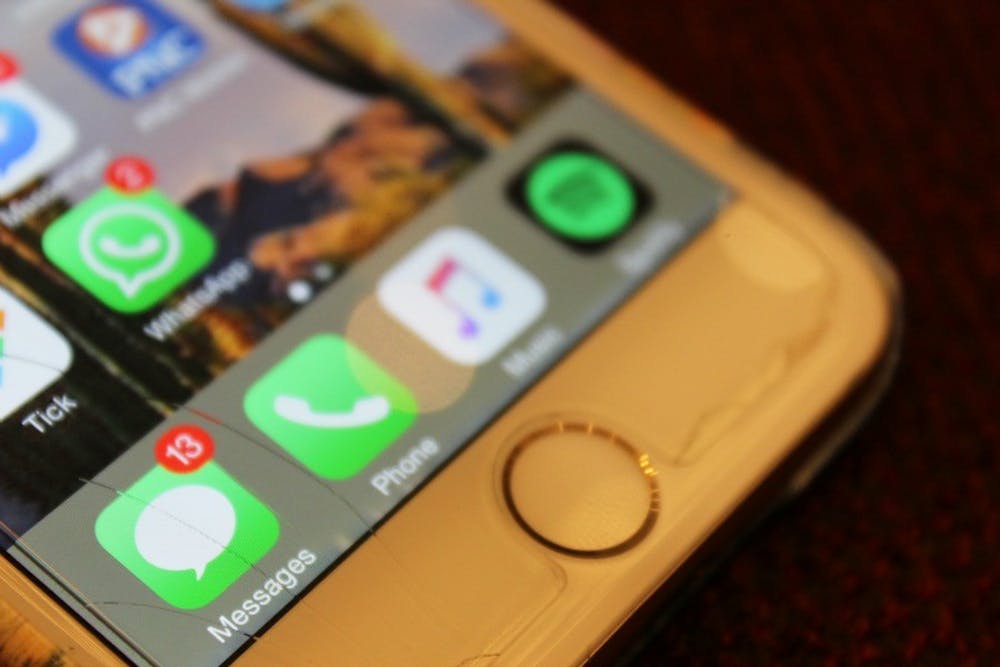Reis' Pieces
By Reis Thebault, Editor-in-Chief
Another hit, another drag, another drink. Yeah, that all sounds familiar. But, what about another "yak," another text, another tweet?
Technology addiction is real. And, at Miami University, we have a lot of junkies.
They don't keep their problem in the dark, either. They aren't holed up in an iDen, sleeping on a stained mattress and obsessively checking news feeds and timelines, keyboards and styluses strewn about.
They're just walking around campus. They're texting, they're sharing, they're "liking," but, no matter what they're doing, it just can't wait. So, they do it while they walk, ignoring their surroundings and immersing themselves in a digitized, online world.
This obsession is everywhere. On Spring Street and Slant Walk, technology has students dodging cars, bikers and other pedestrians.
Please, humor me. For one cross campus traverse, keep your phone in your pocket and your headphones out of your ears. Then, look up. Observe how unique you are in this regard.
This isn't just anecdotal, either. There is actual evidence of addictive tendencies associated with technology use.
In a University of Maryland study, 200 college kids gave up all media for 24 hours (that in itself is worthy of headlines). After their time spent unplugged, these students expressed feelings similar to those present in cases of drug and alcohol withdrawal. Researchers noted signs of anxiety, craving and an inability to function well.
In the past several years, smartphones, MP3 players and tablets have been infiltrating college campuses, from sidewalks to classrooms, diverting attention and providing a quick dump of dopamine.
And, as if all that weren't enough to keep us stimulated, there is now something else. Brought to you by Apple, the harbinger of technological orgasm: The Apple Watch.
Enjoy what you're reading?
Signup for our newsletter
And 'tis the season, right? The Apple Watch isn't new, but Black Friday, Cyber Monday and the whirlwind of holiday sales and ploys have reinvigorated Apple Watch sales.
At a price tag as steep as $17,000, it's coming to the wrists of the moneyed addicts near you.
And why? Why chip away at the last vestiges of attention spans that are shrinking faster than the polar ice caps? Why does everything have to be smart? Phones, TVs, cars, and now jewelry? Is society so hooked that every household item must be able to notify? Will we soon be able to retweet from our toasters? It is a futile battle against red badge notifications, and the Apple Watch is leveling the latest attack.
The worst part is people are totally complicit in this. They're letting themselves become strung out and they don't even know it.
In a review of the Apple Watch, tech site The Verge wrote, "It is designed to participate in nearly every moment of your day" and "It knows when you're wearing it. You can talk to it. You can poke it - and it can poke back."
What the hell?
In praise even more frightening, a New York Times reviewer wrote, "The Watch became something like a natural extension of my body - a direct link, in a way that I've never felt before, from the digital world to my brain."
Yeah, that's exactly the problem. There is hardly any room left to be utilitarian. And sure, no one is being forced to outfit themselves in Apple's spring line of technological opiates, but the fact that people do it anyway is a problem. It's providing another outlet for addiction.
My biggest fear is someone approaching me on the sidewalk, phone in one hand, watch on the other wrist, two eyes on their devices, and no regard for our imminent collision.
If you're not going to tear your eyes away to observe our campus in all its Frostian wonder, then at least put your phones in your pocket for the sake of your fellow students. And, look up, because you're about to run into me.




